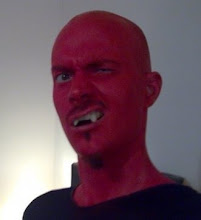Please Give
As a character study of New Yorkers in Brownstone apartment blocks Please Give has the potential to be too clever for its own good and lose much of the audience by indulging in over analysis. Thankfully the film turns out to be a warm and well observed drama with believable roles fleshed out by some decent indie talent.
Catherine Keener plays Kate, a painfully insecure about her well-off status when some fellow New Yorkers are forced to sleep on the streets, but her attempts at help are blinded by her own guilt, so much so that she suffers embarrassment by trying to push handouts on to people who aren’t homeless and her attempt at volunteer work does more harm than good when she breaks down at the sight of disabled people playing sports in a community centre. She works in a retro furniture shop, buying pieces from the relatives of the recently deceased to sell on at inflated prices. The murky morality of this bothers her but not her husband Alex (Oliver Platt) with whom she runs the business, and they have bought the neighbouring apartment from an elderly woman still living there; once she dies they gain ownership. The woman’s granddaughter Rebecca (Rebecca Hall) visits her daily to do chores, whilst the perma-tanned and narcissistic Mary (Amanda Peet) vocally can’t wait to see her die and Kate and Alex’s teenage daughter Abby is going through the usual teen crises, exacerbated by her mother giving bums more money than her.
All the characters have their flaws but there is a definite feeling that the film is rooting for them; you can’t help but sympathise with these people and hope for things to work out. Seldom do films gain release that simply focus on everyday interactions without some sort of contrivance; Please Give is a genuinely mature film, happy to trust the audience without any spoon feeding and sadly a rarity in the release schedules.
Leaving
If you only want to see one continental European drama in 2010 about a wife and mother played by an English actress having an affair with a man slightly more earthy and rugged than her own well-off husband, risking her place in an expensive household for the more rustic charms of a run down pile in an idyllic mountainous countryside then you should watch I Am Love. If you’ve already seen that then you’re left with Leaving.
Such a comparison is less a reflection on Leaving’s weaknesses than it is of I Am Love’s strengths, but Leaving does tell a more familiar tale. Kristin Scott-Thomas is magnetic as Suzanne, nailing the feel of a woman unexpectedly finding herself falling in love in middle age and left as giddy as a teenager, desperate to spend every moment with her new love despite having a husband and two children. It is hard to sympathise with her however, as her husband seems fine and in no way at fault, though once her infidelity comes to light his actions hint at important differences between the two men in her life - he does his best to make things impossible and block her attempts at building a new life, often in a colder, more matter-of-fact way, whilst her lover seems more impulsive - making the initial pass at her, rushing to stop her car rolling away at one point and getting injured in the attempt, an injury he subsequently ignores so that he can return to Spain for a weekend to see his daughter. We learn that he has recently been released from prison, further revealing a more passionate side, though there are never any explicit comparisons between the two men during the film.
Though far more formulaic and pedestrian than I Am Love, Leaving highlights the fact that while people have a definite choice over the act of infidelity itself, they may have considerably less influence over the love that may fuel it.
BASTILLE DAY
9 years ago


































